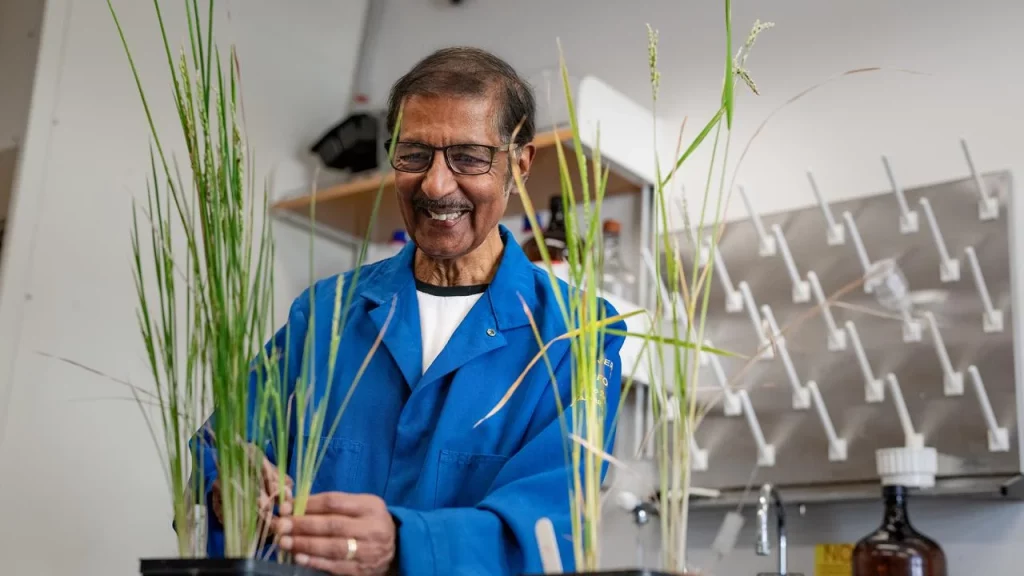California, USA
March 25, 2025
UC Davis joins UC Berkeley and UCSF as the third campus partner collaborating on developing gene-editing solutions to large global problems.
The University of California Davis and the Innovative Genomics Institute (IGI), announced today a formal partnership to jointly pursue real-world applications of genome editing in agriculture and climate change. UC Davis is joining as the IGI’s third partner campus along with UC Berkeley and UCSF.
“As one of the leading institutions in the world studying the implications of climate change on agriculture and ways to provide for a growing world population in the face of climate-related threats, UC Davis is honored to join the Innovative Genomics Institute as a full partner,” says UC Davis Chancellor Gary May. “Working alongside our peers from UC Berkeley and UC San Francisco, our renowned scientists are committed to advancing genome editing for the betterment of all of humanity.”
The IGI, founded by Nobel laureate Jennifer Doudna and now in its 10th year, started as a partnership between UC Berkeley and UCSF to advance CRISPR applications in medicine. This focus quickly expanded to include sustainable agriculture and climate change applications.
The relationship between the IGI and UC Davis extends back eight years to some of the institute’s earliest forays into agricultural research. The combined team now includes four winners of the Wolf Prize in Agriculture, considered by many to be the Nobel Prize for agriculture, in just the past six years: David Zilberman (2019), Pam Ronald (2022), Venkatesan Sundaresan (2024), and Brian Staskawicz (2025).
“One of the wonderful features of CRISPR is that it’s a technology that can be used on animals, plants, microbes — really any organism with DNA,” says Doudna. “I’m thrilled that we have now formally welcomed UC Davis as a full partner of the IGI, building on years of productive work together.”
Creating a Net-Zero Farm
IGI’s work with UC Davis has been in the news recently thanks to a project to fight a significant source of greenhouse gas emissions: cow burps. A $70 million gift from donors through the TED Audacious Project is funding research at UC Davis led by Ermias Kebreab and Matthias Hess and collaborators at UC Berkeley to develop “microbiome editing,” a new CRISPR approach to prevent the microbes that live in the cow gut from producing methane. A parallel project is tackling another significant source of methane: rice paddies. Just like the cows, the methane is produced not by the rice itself, but by microbes that live in the soil below flooded rice paddies. An IGI team led by Jill Banfield at UC Berkeley is studying the soil microbiome of rice paddies to develop interventions that will enable low-methane rice farming.
 Matthias Hess (left) and Ermias Kebreab (right) are working on developing new methods of preventing methane emissions from cows.
Matthias Hess (left) and Ermias Kebreab (right) are working on developing new methods of preventing methane emissions from cows.
In addition to working to stop carbon from going up into the atmosphere, Banfield is working with Pamela Ronald at UC Davis and Jennifer Pett-Ridge at Lawrence Livermore National Laboratory to improve the ability of crop plants to capture atmospheric carbon and store it in the soil. Taken together, the IGI team at Davis and Berkeley is building a set of genomic tools to reduce emissions and maximize carbon removal and long-term storage to fight climate change and realize a vision of a net-zero farm.
Bringing CRISPR to the World
As the climate is changing, agriculture’s job isn’t getting any easier. Sundaresan has been working with the IGI since 2017 on a breakthrough method of using CRISPR to help small farmers around the world grow the highest yielding crops. Sundaresan developed a gene-editing approach that changes the rules of the game, allowing farmers to re-grow hybrid crops such as rice from seed without losing productivity. Another team led by Brian Staskawicz and Dave Savage at UC Berkeley and Savithramma Dinesh-Kumar at UC Davis are developing new tools to make the processing of breeding gene-edited crops easier and more accessible to institutions around the world.
 Venkatesan Sundaresan in his lab at UC Davis
Venkatesan Sundaresan in his lab at UC Davis
To help scale efforts like these, UC Davis and the IGI have been working together on an annual CRISPR course in Kenya with the African Plant Breeding Academy that trains agricultural scientists from across Africa to apply CRISPR gene editing techniques to local problems across the continent. Programs like these help build capacity around the world to address regional problems that might otherwise go unaddressed.
“At the IGI, we specialize in assembling teams of world experts to take on large problems,” says IGI Executive Director Brad Ringeisen. “When it comes to tackling problems in agriculture and climate change, there is no better place in the world than UC Davis.”